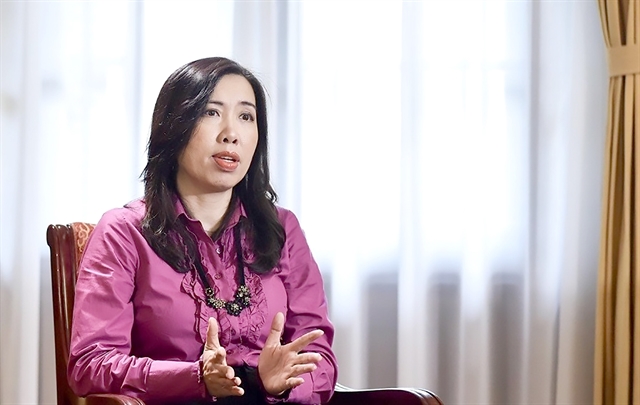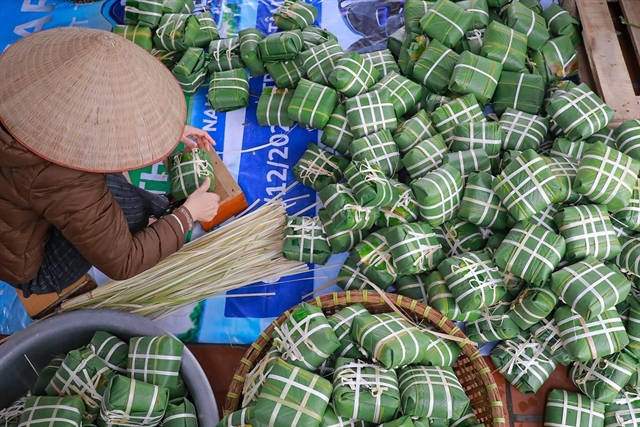 Society
Society

CO
 |
| Deputy Foreign Minister Lê Thị Thu Hằng, who also serves as the Chairwoman of the State Committee for Overseas Vietnamese Affairs. — Photo baoquocte.vn |
Mobilising the intellectual potential of Overseas Vietnamese to contribute to the nation's collective strength is a priority. Deputy Foreign Minister Lê Thị Thu Hằng, who also serves as the Chairwoman of the State Committee for Overseas Vietnamese Affairs, stressed the importance of determination and collaborative efforts to overcome obstacles in resource mobilisation. She talks to Việt Nam and the World magazine about the matter.
Can you provide an overview of the Overseas Vietnamese intellectual situation?
According to estimates, among the nearly 6 million Overseas Vietnamese today, approximately 10 per cent possess university degrees or higher, constituting around 600,000 individuals. This group encompasses two categories: intellectuals from Việt Nam who pursue education abroad and work, as well as intellectuals who are the offspring of generations of Vietnamese residing in foreign countries.
Across pivotal industries and modern scientific domains, spanning electronics, biology, new materials, new energy, information technology, aviation, space, and oceanography, Vietnamese experts actively engage in research and professional activities.
In the ongoing process of nation-building and development, Overseas Vietnamese intellectuals play a crucial role by contributing significantly. They facilitate the transfer of knowledge, incorporate new scientific and technical advancements, and mobilise international resources to enhance Việt Nam's educational infrastructure, thereby elevating the quality of the country's human resources.
Notably, in recent years, Overseas Vietnamese intellectuals have strengthened their regional and global networks, establishing flexible working and cooperation mechanisms for both domestic and foreign experts involved in various projects and programmes. This collaborative effort aligns with Việt Nam's national development strategy.
Given the current era of globalisation and profound international integration, the community of Overseas Vietnamese intellectuals is expected to grow in numbers, diversify across fields, and increasingly assert its standing in the global knowledge environment.
The emerging generation, characterised by creative thinking, is gradually taking the reins from the older generation, serving as a formidable driving force contributing to both the host and home countries.
With a substantial number operating in countries renowned for their advancements in science, technology, and economics, and having undergone training in highly developed and competitive environments, experts and intellectuals from the Overseas Vietnamese community represent a valuable asset.
In the contemporary landscape of science and technology, intellect increasingly stands as a linchpin in the development and resilience of nations. Effectively mobilising the intellectual resources of Overseas Vietnamese holds the potential to significantly contribute to the country's progress, particularly in the realms of science, technology, innovative start-ups, and sustainable development.
Could you elaborate on the progress in attracting Overseas Vietnamese resources over the past two years?
Over the past two years, since the active implementation of Conclusion No. 12/KL-TW by the Politburo on Overseas Vietnamese Affairs in the new situation, the efforts to mobilise Overseas Vietnamese resources have been executed comprehensively, yielding encouraging initial results.
Foremost, there has been a continual elevation of societal awareness regarding the pivotal role of human resources in serving national development. In 2022, the Ministry of Foreign Affairs, in collaboration with relevant agencies, spearheaded an extensive communication campaign to disseminate the content of Conclusion 12 across the entire political spectrum and among people from all walks of life.
Based on this foundation, various departments, ministries, branches, and localities have convened numerous conferences and seminars throughout 2022-2023, specifically focusing on the promotion of resources from the Overseas Vietnamese community. The Government, along with central and local entities, has translated the Party's overarching policies on human resources, particularly in the context of promoting these resources, into tangible legal documents, programs, and field-specific action plans and projects.
Efforts to harness Overseas Vietnamese resources for the country's development are increasingly prioritised, featuring diverse formats, innovative approaches, and creative endeavours, all aimed at unlocking the potential of Overseas Vietnamese resources for the homeland.
Numerous seminars and conferences have been conducted to solicit input from Overseas Vietnamese on development issues, alongside forums and investment trade promotion programmes. Regular initiatives, such as addressing and assisting in problem-solving for Overseas Vietnamese upon their return to their localities for collaboration, are consistently organised. The State Committee for Overseas Vietnamese Affairs has taken the lead in orchestrating approximately 30 conferences and seminars, both in-person and online. Overseas Vietnamese experts, intellectuals, and scientists continue contributing ideas to the Government, offering solutions to challenges that arise during the development process. They provide valuable counsel on effective policies, addressing contemporary issues such as clean energy, green economy, circular economy, high technology, and innovation.
In the economic domain, as of October 2022, Overseas Vietnamese from 35 countries and territories have invested in 385 Foreign Direct Investment (FDI) projects across 42 out of 63 provinces and cities in Việt Nam, amassing a total registered capital of US$1.72 billion. Additionally, there is a noteworthy influx of investment capital from Overseas Vietnamese, taking various forms, including indirect forms or domestic investments (statistics for the latter are not separately available).
Remittances remain a significant positive aspect in leveraging Overseas Vietnamese resources. In 2022, as per the World Bank's report, the total amount of remittances to Việt Nam is projected to reach nearly $19 billion, solidifying Việt Nam's position among the top 10 largest remittance-receiving countries globally.
The role of Overseas Vietnamese in various domains, such as culture, tourism, trade connections, and soft power, is becoming increasingly evident. In alignment with the foreign policy set by the 13th Party Congress, emphasising "building economic diplomacy to serve development with people, localities, and businesses at the core," the Ministry of Foreign Affairs has played a pivotal role in facilitating connections between Overseas Vietnamese's resources and localities.
While celebrating these achievements, it's crucial to acknowledge that the recent initiatives to attract Overseas Vietnamese resources have yet to fully harness the immense potential of this community. The connections and relationships between Overseas Vietnamese intellectuals and business figures and their counterparts in the country are not as robust as they should be, hindering the full utilisation of their strengths.
Additionally, there is a lack of viable programmes and projects to attract overseas experts and intellectuals for collaborative work, and remittances have not been strategically directed towards investments aligning with the country's development orientation and specific industries.
Several subjective and objective factors contribute to these challenges, such as Overseas Vietnamese lacking information about the resources available for attraction, and domestic policies, processes, and procedures requiring refinement. Cumbersome administrative procedures persist in some places and at certain levels, impacting people's enthusiasm to contribute to the country. Many Overseas Vietnamese remain apprehensive, sceptical, and uncertain about long-term investments and employment opportunities in Việt Nam.
Moreover, the absence of a comprehensive national database on Overseas Vietnamese poses a challenge, limiting the collaborative exploitation of this resource by ministries, localities, and businesses. Addressing these issues will be pivotal in unlocking the full potential of Overseas Vietnamese contributions to the country's development.
In your view, what breakthrough policies are essential for more effectively attracting Overseas Vietnamese resources, particularly in key science and technology industries that significantly contribute to the country?
As previously mentioned, the potential of our Overseas Vietnamese in terms of human resources, material assets, and intellectual prowess remains substantial, presenting itself as both an external and internal force driving the country's development.
Recognising the pivotal role of Overseas Vietnamese resources in national development, we must acknowledge that a robust Overseas Vietnamese community contributes to a robust nation and vice versa. A concerted effort is required to overcome obstacles and integrate this crucial resource into the nation's collective strength, aligning with the development goals set forth by the 13th Party Congress.
Several comprehensive measures can be outlined as follows:
First, there is a need to continually refine and enhance the quality and effectiveness of mechanisms and policies aimed at attracting, recruiting, and acknowledging Overseas Vietnamese intellectuals and experts. This entails a thorough review and specific guidance to eliminate obstacles in the implementation of regulations encouraging foreign workers to engage in various activities in Việt Nam, with a special emphasis on priority areas such as science and technology.
Streamlining administrative procedures, empowering authorities, expanding decentralisation, and granting increased autonomy to ministries, branches, localities, and grassroots units requiring the expertise of Overseas Vietnamese professionals should be pursued.
Second, the focus should be on establishing a truly professional, modern, and state-of-the-art scientific research and working environment. This environment will serve as a platform for recruiting Overseas Vietnamese talents, experts, and intellectuals for long-term collaboration, contributing significantly to enhancing the country's indigenous capacity in science and technology. Implementing an investment strategy for key centres in priority fields, acting as hubs connecting with leading global research centres, will serve as a catalyst for advancements in the country's science and technology.
Third, each locality, ministry, and sector should develop flexible strategies and policies tailored to the unique characteristics and practical needs of utilising appropriate talent. This includes effective policies for integrating skilled workers trained in developed countries, fostering trust, and creating opportunities for young talents and outstanding graduates returning from overseas.
Substantial financial investments are required to develop and implement plans and projects to attract Overseas Vietnamese resources. Initiatives may include constructing a comprehensive database of Vietnamese experts and intellectuals, providing support for their return to work in Việt Nam, establishing internationally accredited centres of excellence, and offering preferential credit loans to support Overseas Vietnamese establishing businesses in the high technology and innovation sectors within the country. — VNS




